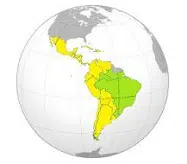According to the dictionary of the Royal Spanish Academy ( RAE ), Ibero-America is the group formed by the countries of the American continent that, in the past, were colonies of the kingdoms of Portugal and Spain . The expression was created from two terms: Iberia (the Iberian Peninsula, mostly occupied by the two European countries already mentioned) and America .
 This first meaning mentioned by the RAE , therefore, alludes to Ibero-America as the region composed of those American countries that belonged to Portugal or Spain . In this framework, Brazil , Argentina , Colombia , Venezuela , Chile , Ecuador , Peru , Paraguay , Bolivia , Uruguay , Cuba , Costa Rica , Guatemala , El Salvador , Honduras , Nicaragua , Puerto Rico , Panama , Dominican Republic and Mexico are the members of Ibero-America .
This first meaning mentioned by the RAE , therefore, alludes to Ibero-America as the region composed of those American countries that belonged to Portugal or Spain . In this framework, Brazil , Argentina , Colombia , Venezuela , Chile , Ecuador , Peru , Paraguay , Bolivia , Uruguay , Cuba , Costa Rica , Guatemala , El Salvador , Honduras , Nicaragua , Puerto Rico , Panama , Dominican Republic and Mexico are the members of Ibero-America .
However, Portugal and Spain are sometimes included in the concept . In this way, Ibero-America would be made up of the twenty American nations detailed above, plus the two European States.
Among the most interesting data that we can highlight from Ibero-America are some such as the following:
-By population size, the most important countries are Brazil, with more than 210 million inhabitants; Mexico, with 125 million citizens; Colombia, with 49 million inhabitants; Spain, with 46 million inhabitants, and Argentina, with 44 million citizens. On the contrary, among the least populated are Andorra, Puerto Rico, Uruguay and Panama.
-Although Spanish and Portuguese are the most spoken languages in Latin America, there are also other significant languages such as Aymara, Guaraní, the Mayan languages, Mapudungún, Nahuatl, Quechua , Rapanui, Catalan, Galician and Basque. .
-If we take into account what the human development index (HDI) is, the countries that have it highest are Spain, Portugal, Chile, Puerto Rico, Argentina and Uruguay. On the contrary, those with a medium HDI are El Salvador, Guatemala, Nicaragua and Honduras.
-Since the beginning of the 90s, the Ibero-American Summit has been held annually. Throughout the history of this event, significant events have occurred that have gone around the world. This would be the case, for example, of the summit that took place in 2007 in Santiago de Chile and during it the Spanish King Juan Carlos I got angry with the president of Venezuela to whom he shouted out loud: "Why won't you shut up?
It is important not to confuse Ibero-America with Hispanic America , since this second notion refers to the American countries where Spanish is spoken. That is why Brazil is part of Ibero-America (it belonged to the kingdom of Portugal ) but not of Latin America (its official language is Portuguese and not Spanish).
Latin America , meanwhile, is made up of countries where the majority of inhabitants speak languages that derive from Latin, such as Spanish, Portuguese or French. Haiti , then, is part of Latin America (its citizens communicate in French and Haitian Creole) although not Latin America (the nation was a French colony for many years).
